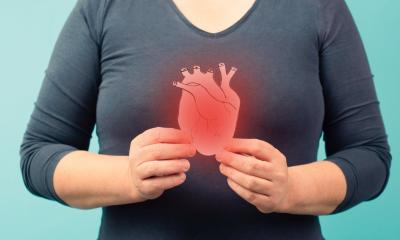News • Women's health
Hypertension symptoms in women often mistaken for menopause
Pregnancy complications and early menopause increase women’s future risk of heart disease. Cardiologists, gynaecologists and endocrinologists recommend how to help middle-aged women prevent later heart problems in a European Society of Cardiology (ESC) consensus document published in European Heart Journal, a journal of the ESC.1

“Physicians should intensify the detection of hypertension in middle-aged women,” states the document. Up to 50% of women develop high blood pressure before the age of 60 but the symptoms – for example hot flushes and palpitations – are often attributed to menopause. “High blood pressure is called hypertension in men but in women it is often mistakenly labelled as ‘stress’ or ‘menopausal symptoms’,” said first author Professor Angela Maas, director of the Women’s Cardiac Health Programme, Radboud University Medical Centre, Nijmegen, the Netherlands. “We know that blood pressure is treated less well in women compared to men, putting them at risk for atrial fibrillation, heart failure and stroke – which could have been avoided.”
“A woman’s life provides clues that you need to start early with prevention,” said Professor Maas. “We have to assess female patients differently to men, and not just ask about high cholesterol. This will enable us to classify middle-aged women as high-risk or lower risk for cardiovascular disease.”
Pre-eclampsia is linked with a four-fold increase in heart failure and hypertension and a doubled risk of stroke. Women who have an early natural (i.e. not surgical) menopause before the age of 40 are also more likely to develop cardiovascular disease – each year is associated with a 3% raised risk. Autoimmune inflammatory conditions such as rheumatoid arthritis and lupus are more common in women compared to men and increase cardiovascular risk around menopause.
“There are several phases of life when we can identify subgroups of high-risk women,” said Professor Maas. “High blood pressure during pregnancy is a warning sign that hypertension may develop when a woman enters menopause and it is associated with dementia many decades later. If blood pressure is not addressed when women are in their 40s or 50s, they will have problems in their 70s when hypertension is more difficult to treat.”
The document provides guidance on how to manage heart health during menopause, after pregnancy complications, and during other conditions such as breast cancer and polycystic ovarian syndrome (PCOS). The important role of a healthy lifestyle and diet is recognised – e.g. for optimal management of menopausal health and in women with PCOS, who have elevated risks of high blood pressure during pregnancy and type 2 diabetes.
While menopausal hormone therapy is indicated to alleviate symptoms such as night sweats and hot flushes in women over 45, the authors recommend assessment of cardiovascular risk factors before initiation. Therapy is not recommended in women at high cardiovascular risk or after a stroke, heart attack, or blood clot.
The document provides advice for transgender women (persons assigned male at birth). “These women need hormone therapy for the rest of their lives and the risk of blood clots increases over time,” said Professor Maas. The document states that transgender women “should always be encouraged to reduce modifiable lifestyle risks” while acknowledging that “the psychosocial benefits of hormone therapy with an improved body image may result in healthier lifestyle choices”.
Collaboration between cardiologists, gynaecologists and endocrinologists is needed to provide the best care to female patients, noted Professor Maas. She said: “Women can help their doctors prevent heart problems and make earlier diagnoses by mentioning issues like complicated pregnancies and early menopause and monitoring their own blood pressure.”
Source: European Society of Cardiology
28.01.2021





